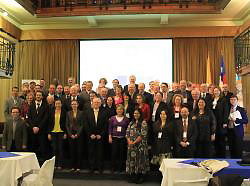Second ICLARS Conference, Religion and Constitution, Chile, September 2011

The International Consortium for Law and Religion Studies (ICLARS) held its Second Conference, Religion and Constitution, in Santiago, Chile, 8-10 September 2011. The conference addressed such issues as the role for religions in contemporary society, how much States are prepared to accept the growing relevance of religions in their legal systems, whether constitutions provide adequate instruments to govern the role of religions in the public square, and the religion and equal treatment in China and Nepal. The conference was opened by outgoing (and now Honorary) ICLARS President, Professor Silvio Ferrari. Distinguished participants came from South and North America, and from Europe, Israel, Africa, China, and Nepal.
[From the ICLARS report by Ana Maria Celis:]
Professor W. Cole Durham Jr. provided with his opening key speech the framework for the following discussions. His speech emphasized the importance of those constitutional provisions that protect religious entities’ autonomy, useful not just for the protection of religion, but also for its promotion. In the following days the discussion returned many times to the relevance of religious bodies’ self determination, a major topic in different countries and in the case-law of international courts.
A second major theme during the conference – religion and equal treatment – was introduced by Prof. Javier Martínez-Torrón in his speech “Equals before the law?”. The importance of this issue can be underlined by the simultaneous workshops closely linked to this topic, which tried to take into account “The status of religious, ethnic and cultural minorities”, “Religion and equal treatment in Latin American Constitutions” and “Religion and equal treatment in China and Nepal”.
During the plenary sessions different constitutions from around the globe were examined under different lenses: the mentions of God and/or religion in the constitutional preambles, the relations among Church and State and the constitutional references to religious legal systems as a source of State law, as in the case of the shari’a or the basic laws of Israel. A further topic that came under observation during other sessions was the constitutional guarantees of religious freedom exemplified by the relation between freedom of religion, on the one hand, and freedom of conscience and freedom of expression on the other. The relevance of religious freedom in this conference program brought the debate towards difficult subjects such as the relation between religious freedom and the right to life or education.
A prominent, and certainly fruitful, moment within this year conference was the meeting between scholars and editors of different law journals (a list of which can be found at the bottom of this short review). This meeting promoted the importance of a cooperation between scholars and editors, underlined the specific differences between the various journals and how these nuances should be helpful in promoting the discipline.
The final speech, which summed up and closed the conference works, was given by prof. Ana Maria Celis, organizer and host of this second successful ICLARS conference, which, for the second time, tried to address today’s many different issues of Law and Religion.
[End Celis summary.]
It was announced at the conference that Professor W. Cole Durham, Jr., Director of the International Center for Law and Religion Studies (ICLRS) of the J. Reuben Clark Law School at Brigham Young University, is installed as new ICLARS President. Professor Durham had been serving as ICLARS Vice President. The Steering Committee of the association is now comprised by Ana Maria Celis (Chile), Pieter Coertzen (South Africa), Silvio Ferrari (Italy), Iván Ibán (Spain), Tahir Mahmood (India), Asher Maoz (Israel), Juan Navarro Floria (Argentina) and Gerhard Robbers (Germany).
ICLARS is an international network of scholars and experts of law and religion. It began in 2007, with the aim of providing a place where information, data, and opinions could be exchanged among members and made available to the broader scientific community. To this end, ICLARS organizes conferences and publishes a newsletter. The First ICLARS Conference, “Law and Religion in the 21st Century: Relations between States and Religious Communities,” was held in Milan in 2009; its proceedings have been published by Ashgate.
The next ICLARS conference will be held in 2013 or 2014.